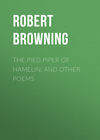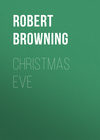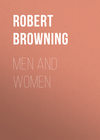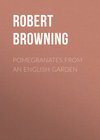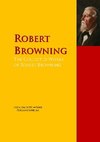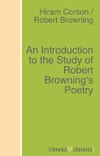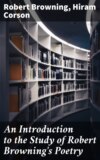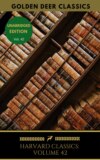Buch lesen: «The Pied Piper of Hamelin, and Other Poems», Seite 4
Schriftart:
Some irregular proceeding? We conjecture in the dark,
Guess at random, – still, for sake of fair play – what if for a freak,
In a fit of absence, – such things have been! – if our friend proved weak
– What’s the phrase? – corrected fortune! Look into the case, at least!”
Who dared interpose between the altar’s victim and the priest?
Yet he spared me! You eleven! Whosoever, all or each,
To the disadvantage of the man who spared me, utters speech
– To his face, behind his back, – that speaker has to do with me:
Me who promise, if positions change, and mine the chance should be,
Not to imitate your friend and waive advantage!’
“Twenty-five
Years ago this matter happened: and ’tis certain,” added Clive,
“Never, to my knowledge, did Sir Cocky have a single breath
Breathed against him: lips were closed throughout his life, or since his death,
For if he be dead or living I can tell no more than you.
All I know is – Cocky had one chance more; how he used it, – grew
Out of such unlucky habits, or relapsed, and back again
Brought the late-ejected devil with a score more in his train, —
That’s for you to judge. Reprieval I procured, at any rate.
Ugh – the memory of that minute’s fear makes gooseflesh rise! Why prate
Longer? You’ve my story, there’s your instance: fear I did, you see!”
“Well” – I hardly kept from laughing – “if I see it, thanks must be
Wholly to your Lordship’s candour. Not that – in a common case —
When a bully caught at cheating thrusts a pistol in one’s face,
I should under-rate, believe me, such a trial to the nerve!
’Tis no joke, at one-and-twenty, for a youth to stand nor swerve.
Fear I naturally look for – unless, of all men alive,
I am forced to make exception when I come to Robert Clive.
Since at Arcot, Plassy, elsewhere, he and death – the whole world knows —
Came to somewhat closer quarters.”
Quarters? Had we come to blows,
Clive and I, you had not wondered – up he sprang so, out he rapped
Such a round of oaths – no matter! I’ll endeavour to adapt
To our modern usage words he – well, ’twas friendly license – flung
At me like so many fire-balls, fast as he could wag his tongue.
“You – a soldier? You – at Plassy? Yours the faculty to nick
Instantaneously occasion when your foe, if lightning-quick,
– At his mercy, at his malice, – has you, through some stupid inch
Undefended in your bulwark? Thus laid open, – not to flinch
– That needs courage, you’ll concede me. Then, look here! Suppose the man,
Checking his advance, his weapon still extended, not a span
Distant from my temple, – curse him! – quietly had bade me, ‘There!
Keep your life, calumniator! – worthless life I freely spare:
Mine you freely would have taken – murdered me and my good fame
Both at once – and all the better! Go, and thank your own bad aim
Which permits me to forgive you!’ What if, with such words as these,
He had cast away his weapon? How should I have borne me, please?
Nay, I’ll spare you pains and tell you. This, and only this, remained —
Pick his weapon up and use it on myself. If so had gained
Sleep the earlier, leaving England probably to pay on still
Rent and taxes for half India, tenant at the Frenchman’s will.”
“Such the turn,” said I, “the matter takes with you? Then I abate
– No, by not one jot nor tittle, – of your act my estimate.
Fear – I wish I could detect there: courage fronts me, plain enough —
Call it desperation, madness – never mind! for here’s in rough
Why, had mine been such a trial, fear had overcome disgrace.
True, disgrace were hard to bear: but such a rush against God’s face
– None of that for me, Lord Plassy, since I go to church at times,
Say the creed my mother taught me! Many years in foreign climes
Rub some marks away – not all, though! We poor sinners reach life’s brink,
Overlook what rolls beneath it, recklessly enough, but think
There’s advantage in what’s left us – ground to stand on, time to call
‘Lord, have mercy!’ ere we topple over – do not leap, that’s all!”
Oh, he made no answer, re-absorbed into his cloud. I caught
Something like “Yes – courage; only fools will call it fear.”
If aught
Comfort you, my great unhappy hero Clive, in that I heard,
Next week, how your own hand dealt you doom, and uttered just the word
“Fearfully courageous!” – this, be sure, and nothing else I groaned.
I’m no Clive, nor parson either: Clive’s worst deed – we’ll hope condoned.
MULÉYKEH
If a stranger passed the tent of Hóseyn, he cried “A churl’s!”
Or haply “God help the man who has neither salt nor bread!”
– “Nay,” would a friend exclaim, “he needs nor pity nor scorn
More than who spends small thought on the shore-sand, picking pearls,
– Holds but in light esteem the seed-sort, bears instead
On his breast a moon-like prize, some orb which of night makes morn.
“What if no flocks and herds enrich the son of Sinán?
They went when his tribe was mulct, ten thousand camels the due,
Blood-value paid perforce for a murder done of old.
‘God gave them, let them go! But never since time began,
Muléykeh, peerless mare, owned master the match of you,
And you are my prize, my Pearl: I laugh at men’s land and gold!’
“So in the pride of his soul laughs Hóseyn – and right, I say.
Do the ten steeds run a race of glory? Outstripping all,
Ever Muléykeh stands first steed at the victor’s staff.
Who started, the owner’s hope, gets shamed and named, that day.
‘Silence,’ or, last but one, is ‘The Cuffed,’ as we used to call
Whom the paddock’s lord thrusts forth. Right, Hóseyn, I say, to laugh!”
“Boasts he Muléykeh the Pearl?” the stranger replies: “Be sure
On him I waste nor scorn nor pity, but lavish both
On Duhl the son of Sheybán, who withers away in heart
For envy of Hóseyn’s luck. Such sickness admits no cure.
A certain poet has sung, and sealed the same with an oath,
‘For the vulgar – flocks and herds! The Pearl is a prize apart.’”
Lo, Duhl the son of Sheybán comes riding to Hóseyn’s tent,
And he casts his saddle down, and enters and “Peace!” bids he.
“You are poor, I know the cause: my plenty shall mend the wrong.
’Tis said of your Pearl – the price of a hundred camels spent
In her purchase were scarce ill paid: such prudence is far from me
Who proffer a thousand. Speak! Long parley may last too long.”
Said Hóseyn, “You feed young beasts a many, of famous breed,
Slit-eared, unblemished, fat, true offspring of Múzennem:
There stumbles no weak-eyed she in the line as it climbs the hill.
But I love Muléykeh’s face: her forefront whitens indeed
Like a yellowish wave’s cream-crest. Your camels – go gaze on them!
Her fetlock is foam-splashed too. Myself am the richer still.”
A year goes by: lo, back to the tent again rides Duhl.
“You are open-hearted, ay – moist-handed, a very prince.
Why should I speak of sale? Be the mare your simple gift!
My son is pined to death for her beauty: my wife prompts ‘Fool,
Beg for his sake the Pearl! Be God the rewarder, since
God pays debts seven for one: who squanders on Him shows thrift.’”
Said Hóseyn, “God gives each man one life, like a lamp, then gives
That lamp due measure of oil: lamp lighted – hold high, wave wide
Its comfort for others to share! once quench it, what help is left?
The oil of your lamp is your son: I shine while Muléykeh lives.
Would I beg your son to cheer my dark if Muléykeh died?
It is life against life: what good avails to the life-bereft?”
Another year, and – hist! What craft is it Duhl designs?
He alights not at the door of the tent as he did last time,
But, creeping behind, he gropes his stealthy way by the trench
Half-round till he finds the flap in the folding, for night combines
With the robber – and such is he: Duhl, covetous up to crime,
Must wring from Hóseyn’s grasp the Pearl, by whatever the wrench.
“He was hunger-bitten, I heard: I tempted with half my store,
And a gibe was all my thanks. Is he generous like Spring dew?
Account the fault to me who chaffered with such an one!
He has killed, to feast chance comers, the creature he rode: nay, more —
For a couple of singing-girls his robe has he torn in two:
I will beg! Yet I nowise gained by the tale of my wife and son.
“I swear by the Holy House, my head will I never wash
Till I filch his Pearl away. Fair dealing I tried, then guile,
And now I resort to force. He said we must live or die:
Let him die, then, – let me live! Be bold – but not too rash!
I have found me a peeping-place: breast, bury your breathing while
I explore for myself! Now, breathe! He deceived me not, the spy!
“As he said – there lies in peace Hóseyn – how happy! Beside
Stands tethered the Pearl: thrice winds her headstall about his wrist:
’Tis therefore he sleeps so sound – the moon through the roof reveals.
And, loose on his left, stands too that other, known far and wide,
Buhéyseh, her sister born: fleet is she yet ever missed
The winning tail’s fire-flash a-stream past the thunderous heels.
“No less she stands saddled and bridled, this second, in case some thief
Should enter and seize and fly with the first, as I mean to do.
What then? The Pearl is the Pearl: once mount her we both escape.”
Through the skirt-fold in glides Duhl, – so a serpent disturbs no leaf
In a bush as he parts the twigs entwining a nest: clean through,
He is noiselessly at his work: as he planned, he performs the rape.
He has set the tent-door wide, has buckled the girth, has clipped
The headstall away from the wrist he leaves thrice bound as before,
He springs on the Pearl, is launched on the desert like bolt from bow.
Up starts our plundered man: from his breast though the heart be ripped,
Yet his mind has the mastery: behold, in a minute more,
He is out and off and away on Buhéyseh, whose worth we know!
And Hóseyn – his blood turns flame, he has learned long since to ride,
And Buhéyseh does her part, – they gain – they are gaining fast
On the fugitive pair, and Duhl has Ed-Dárraj to cross and quit,
And to reach the ridge El-Sabán, – no safety till that he spied!
And Buhéyseh is, bound by bound, but a horse-length off at last,
For the Pearl has missed the tap of the heel, the touch of the bit.
She shortens her stride, she chafes at her rider the strange and queer:
Buhéyseh is mad with hope – beat sister she shall and must,
Though Duhl, of the hand and heel so clumsy, she has to thank.
She is near now, nose by tail – they are neck by croup – joy! fear!
What folly makes Hóseyn shout “Dog Duhl, Damned son of the Dust,
Touch the right ear and press with your foot my Pearl’s left flank!”
And Duhl was wise at the word, and Muléykeh as prompt perceived
Who was urging redoubled pace, and to hear him was to obey,
And a leap indeed gave she, and evanished for evermore.
And Hóseyn looked one long last look as who, all bereaved,
Looks, fain to follow the dead so far as the living may:
Then he turned Buhéyseh’s neck slow homeward, weeping sore.
And, lo, in the sunrise, still sat Hóseyn upon the ground
Weeping: and neighbours came, the tribesmen of Bénu-Asád
In the vale of green Er-Rass, and they questioned him of his grief;
And he told from first to last how, serpent-like, Duhl had wound
His way to the nest, and how Duhl rode like an ape, so bad!
And how Buhéyseh did wonders, yet Pearl remained with the thief.
And they jeered him, one and all: “Poor Hóseyn is crazed past hope!
How else had he wrought himself his ruin, in fortune’s spite?
To have simply held the tongue were a task for boy or girl,
And here were Muléykeh again, the eyed like an antelope,
The child of his heart by day, the wife of his breast by night!” —
“And the beaten in speed!” wept Hóseyn. “You never have loved my Pearl.”
Altersbeschränkung:
12+Veröffentlichungsdatum auf Litres:
25 Juni 2017Umfang:
50 S. 1 IllustrationRechteinhaber:
Public Domain